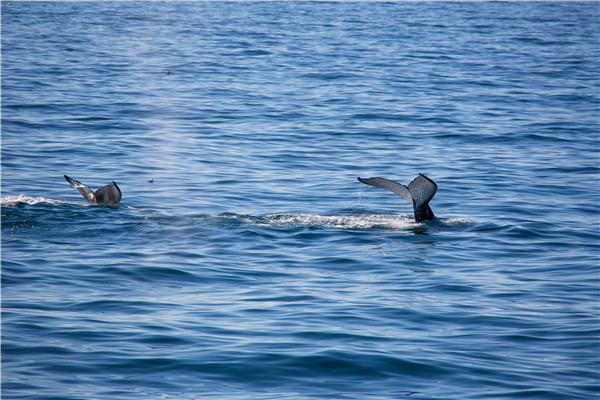Cruising on the wild side
Updated: 2015-09-21 08:21
By Mike Peters(China Daily)
|
||||||||
 |
|
Spotting whales is a highlight of cruises to the Arctic and the Antarctic. [Photo by Bruno Cazarini/For China Daily] |
"I am very sorry to interrupt your excellent dinner," booms the godlike voice of the expedition leader on a loudspeaker, "but I suggest you get up and go to the port-side deck. Right away!"
"Either the ship is sinking or he's spotted a whale," one of my dinner companions jokes, "and he didn't tell us to fetch our life jackets."
Stefan Kredel has indeed seen a whale-in fact, a pod of whales, and by the time we scramble outside to look they are all around us, mostly humpbacks though at one point a fin whale pops above the surface.
Wildlife spotting is one of the joys of any cruise. On this one, we'll see whales several times and an intriguing array of birds every day. Polar bears are possible this far south but more likely on the Silver Explorer's cruise to Svalbard, Norway-where they are so common the expedition team includes a polar-bear guard who is armed on all shore visits.
"People think I'm here to protect them from the polar bears," says Chris Srigley, the naturalist with that job. "But I'm really here to protect the bears from people."
The bottom line: get close enough to see, but maintain a safe distance.
Srigley notes that Antarctic cruises can promise more wildlife sightings than our Greenland cruise, since creatures like musk ox, caribou and reindeer don't frequent our path on the coastline.
"The musk ox you are likely to see will be in the meat market," he says, smiling. "But you'll see plenty of seals."
Later, marine biologist Uli Erfurth creates a sensation by scooping a small jellyfish out of the water and into the Zodiac he's guiding. "I love these guys," he says, as most of those on board edge away a bit.
Full-grown "jellies" can develop a bell-shaped body as big as 3 meters and tentacles that can spread a hundred meters, he says. He holds the juvenile specimen in his hand, noting that "99 percent" of the jellyfish's toxin cells are in the tentacles underneath.
To demonstrate the harmlessness of the bell-shaped dome, he sticks out his tongue and licks the slick surface-where he immediately finds that pesky 1 percent chance of trouble.
As his tongue swells up and his speech thickens cartoonishly, his immediate neighbors in the boat inch further away.
For the biologist, it's all in a day's work, and he has a good laugh at himself as he tells the story around the ship later.
- UN chief: Those blocking fleeing refugees should 'stand in their shoes'
- Hungarian riot police detain migrants
- IOC announces five cities bid for 2024 summer Olympic
- Japan opposition to halt vote on security bills
- Japan protesters rally as security bills near passage
- Australia launches first air strikes against IS

 Across America over the week (Sept 12-18)
Across America over the week (Sept 12-18)
 House showcasing Sino-American friendship open
House showcasing Sino-American friendship open
 Top 10 M&A deals between China and US in 2015
Top 10 M&A deals between China and US in 2015
 Messy dorm earns grueling punishinment for students
Messy dorm earns grueling punishinment for students
 Seven killed in landslide in SW China
Seven killed in landslide in SW China
 Chinese forces arrive in Malaysia for military exercise
Chinese forces arrive in Malaysia for military exercise
 Top 10 M&A deals between China and US in 2015
Top 10 M&A deals between China and US in 2015
 Delicious bites in record-breaking sizes
Delicious bites in record-breaking sizes
Most Viewed
Editor's Picks

|

|

|

|

|

|
Today's Top News
Young people from US look forward to Xi's state visit: Survey
Japan enacts new security laws to overturn postwar pacifism
Court catalogs schools' violent crimes
'Beauty of Beijing's alleys akin to a wise, old person'
China makes progress fighting domestic, international cyber crime
Benefits system for disabled to start
Foreign media welcome, President Xi says
Chinese premier meets with French finance minister
US Weekly

|

|







